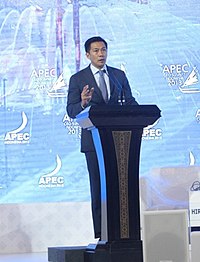Leader
| Part of a series on |
| Psychology |
|---|
 |
|
|

Leadership, both as a research area and as a practical skill, encompasses the ability of an individual, group or organization to "lead", influence or guide other individuals, teams, or entire organizations. The word "leadership" often gets viewed as a contested term.[1][2] Specialist literature debates various viewpoints on the concept, sometimes contrasting Eastern and Western approaches to leadership, and also (within the West) North American versus European approaches.
U.S. academic environments define leadership as "a process of social influence in which a person can enlist the aid and support of others in the accomplishment of a common and ethical task".[3][4] Basically, leadership can be defined[by whom?] as an influential power-relationship in which the power of one party (the "leader") promotes movement/change in others (the "followers").[5] Some have challenged the more traditional managerial views of leadership (which portray leadership as something possessed or owned by one individual due to their role or authority), and instead advocate the complex nature of leadership which is found at all levels of institutions, both within formal[6] and informal roles.[7][need quotation to verify]
Studies of leadership have produced theories involving (for example) traits,[8] situational interaction, function, behavior,[9] power, vision[10] and values,[11][need quotation to verify] charisma, and intelligence, among others.[4]
- ↑ Grint, Keith (2005). Leadership: Limits and Possibilities. London: Palgrave. ISBN 9780333963876.
Moral leadership is not the way to secure democracy, morality and justice because morality, like power and leadership is an essentially contested concept [...].
Search this book on
- ↑ Western, Simon (2013). Leadership: A critical text. London: Sage. p. 26. ISBN 9781446294208.
Leadership is a contested term with multiple meanings and diverse practical applications.
Search this book on
- ↑ Chemers, M. (1997). An integrative theory of leadership. Lawrence Erlbaum Associates, Publishers. ISBN 978-0-8058-2679-1. Search this book on

- ↑ 4.0 4.1 Chin, Roger (2015). "Examining teamwork and leadership in the fields of public administration, leadership, and management". Team Performance Management. 21 (3/4): 199–216. doi:10.1108/TPM-07-2014-0037.
- ↑ Northouse, Peter G. (2018). Leadership: Theory and Practice (8 ed.). CA: Sage Publication. ISBN 9781506362298.
[...] some define leadership in terms of the power relationship that exists between leaders and followers.
Search this book on
- ↑ Institutional Leadership: past, present, and future, the Sage Handbook of Organizational Institutionalism. By: Marvin Washington and Kimberly Boal.
- ↑ Goleman, D., Boyatzis, R.E., and McKee, A. (2003) The New Leaders: Transforming the art of leadership. London: Sphere. ISBN 9780751533811 Search this book on
 .
.
- ↑ Locke et al. 1991
- ↑ Goldsmith Marshall, "Leaders Make Values Visible", 2016
- ↑
For example:
Saffold, Guy (2005). "Leadership Through Vision". Strategic Planning: Leadership through Vision. Nairobi: Evangel Publishing House. p. 137. ISBN 9789966201225. Retrieved 11 November 2021.
[...] leadership is about the future; and the future is about vision.
Search this book on
- ↑
Richards, Dick; Engel, Sarah (2005). "After the vision: suggestions to corporate visionaries and vision champions". In Adams, John D. Transforming Leadership (2nd ed.). New York: Cosimo. p. 206. ISBN 9781596053656. Retrieved 11 November 2021. Unknown parameter
|orig-date=ignored (help) Search this book on
